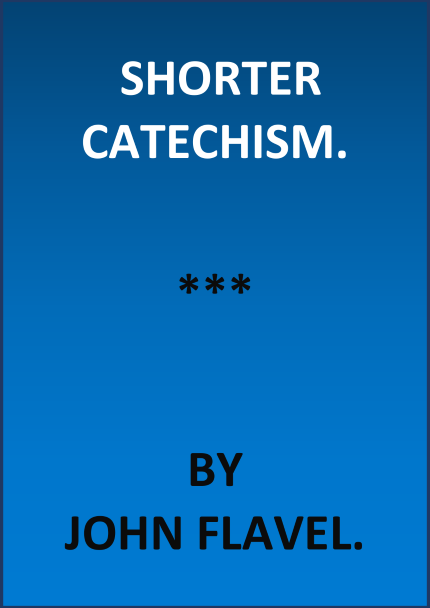By John Flavel.

Exposition of the Shorter Catechism,
With Practical Inferences from Each Question
John Flavel, 1688
About the Author:
John Flavel (1627-1691) was an English Presbyterian minister and author, known for his devotional writings and sermons. He served as a pastor in the town of Dartmouth, England, and was a prominent figure in the Puritan movement of the 17th century. Some of his notable works include “Navigation Spiritualized” and “The Method of Grace.”
FROM THE PREFACE
That catechizing is an ordinance of God, few will doubt, when they consider the apostles did first lay the fundamentals of religion; Hebrews 6:1. And “fed babes with milk, teaching them the first principles of the oracles of God,” Hebrews 5:12 and doubtless taught them in that manner, which was most suitable to the capacity of the learners, which may be well supposed to be by plain and short questions, and suitable answers there unto; and therefore this has been a constant practice in the church of God; and the primitive church had a particular person appropriated thereunto, whom they called Catechist.
And so all well-governed, and wisely-managed churches, have still maintained and used it, as knowing the necessity and usefulness thereof; for the younger sort to inform them in the principles of that religion where into they were baptized; and for the establishment of the adult and more aged therein. Hence have issued those little composures of all the fundamental doctrines of faithand practice so handled (which we call Catechisms) in the churches; andparticularly in ours, whereof there are many and divers, whose authors have well deserved for their endeavors to inform and edify the people thereby.
But among them all, none excel this little Catechism of the Assembly for orthodoxy, fullness, and method. And because the answers therein are some of them pretty large, and treat of the most profound mysteries of our religion; therefore several persons have bestowed their good and laudable pains, some in descanting more largely, and proving by scriptural reasons the particulars: one has shown the harmony thereof with the articles and homilies of the church of England (designed, I suppose, to remove the prejudice which some have taken against it:) others have parted the questions and answers into several little ones, under each, to make them more intelligible to younger ones, and more easy to be remembered.
Among whom, worthy, orthodox, and excellent Mr. John Flavel may be ranked, who among other of his many most profitable labors, applied himself to the chewing of this bread of life, or crumbling it into smaller pieces, for theconvenience of children, and, indeed, of all; wherein (as in all his other works) hehas shown himself a workman, that needs not to be ashamed.
There needs no other recommendation to this posthumous piece, but the worthy author’s name; he was removed before he had completely finished it; he had prepared his questions and answers upon the second petition of the Lord’s Prayer; but lived not to propose them in the public congregation. God then translated him into his kingdom of glory above, while he was so industriously endeavoring to promote the kingdom of grace below.
The other five remaining questions and answers (to complete the work) were doneby a ruder hand; as may be easily discerned by any observant reader, who will find himself transferred from a plain, clear, and delightful stile, method, and manner, into more rough, disorderly, and unpleasant ones; for, who indeed could equal this divine laborer? Not the completer; who would account himself to have made very great attainments in divinity and usefulness, if he were left but a few furlongs behind him. Let the reader use and peruse this piece, and he wall see cause to bless God for the author.